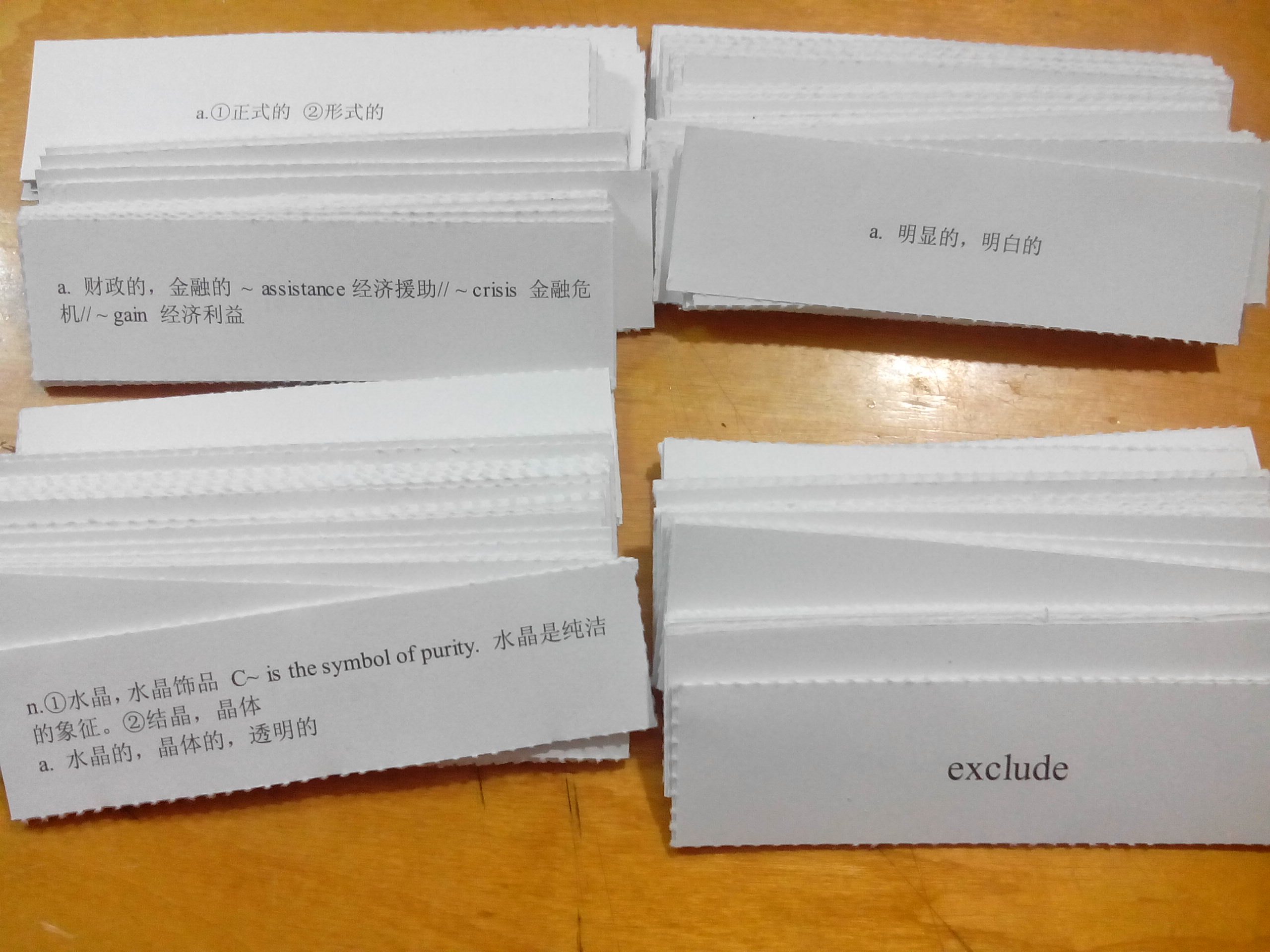 返回
教育头条
返回
教育头条

2020考研英语考试秘笈 考研经验总结
语法的重要性小编已经说过很多次了,没有语法基础光靠背单词是不可能读懂长难句,也无法在阅读上取得高分的。为了方便大家记忆,小编整理了考研英语语法精炼,希望可以帮助大家更方便的学习英语~
一、it强调句型
在表示强调的结构中,it 可用作先行代词,这种结构的句型如下:It is/was 被强调的部分 that 其他部分。如果强调的部分是人,可用who, whom 代替that.例如:Professor Wang teaches us English every Monday afternoon.王教授每星期一下午教我们英语。强调主语:It is Professor Wang who teaches us English every Monday afternoon.强调间接宾语:It is us whom Prof. Wang teaches English every Monday afternoon.强调直接宾语:It is English that Prof. Wang teaches us every Monday afternoon.强调状语:It is every Monday afternoon that Prof. Wang teaches us English.
1)该上课了,快。It is time for class. Hurry up.
2)从这儿到你们学校远吗不远,大约一公里。Is it far from here to your school No, it isn’t. It’s about a kilometer.
3)从我家到颐和园去很近。It is very near from my home to the Summer Palace.
4)(天)正在下雨。It’s raining now.
5)电灯是爱迪生发明的。It was Edison who invented the electric light.
6)我认为学习一门外语是很重要的。I think it important to learn a foreign language.
7)他通常一天读两次英语。He made it a rule to read English twice a day.
8)从我家去广场坐公共汽车大约要一个小时。It takes about an hour to go from my home to the Tian’anmen Square by bus.反意疑问句反意疑问句相当于“对不对”“好不好”“行不行”,用yes或 no 回答。由两部分组成,前一部分是陈述句,后一部分是附加疑问短语,中间用逗号隔开,所以反意疑问句又叫附加疑问句。通常的形式是:肯定的陈述句 否定的附加疑问,或否定的陈述句 肯定的附加疑问。如:He studies English, doesn’t heHe doesn’t study English, does heThey are from America, aren’t theyThey are not from America, are they反意疑问句的主要形式:
1.如果主句是be或其他助动词(如can, shall, will 等),其反意疑问句用同一助动词。如:We are late, aren’t weYou haven’t met my wife, have youHe can drive a car, can’t heThey used to have difficulty in just making ends meet, didn’t (usedn’t) theyYou’d better eat with knives and forks, hadn’t you
2.如果主语带有seldom, hardly, never, rarely, few, little等否定词或半否定词时,因为主句本身具有否定意义,附加疑问部分的动词用肯定式,如:We seldom go to the cinema, do weSue almost never worked, did she
3.如果主句部分是 “I am…”结构,由于”am not” 没有相应的缩略形式,附加疑问部分一般用aren’t I 代替。如:I am your friend, aren’t II’m late, aren’t II am a student, aren’t I在祈使句中的附加疑问部分一般用will you, won’t you.

4. 在祈使句中的附加疑问部分一般用will you, won’t you.如:Sit down, will youHave some tea, won’t youOpen the window, won’t you这种句子可以理解为: Will you do something如:Will you open the window注意:否定的祈使句之后,只能用will.如:Don’t forget, will youDon’t make so much noise, will you
5.以Let’s… 开头的祈使句,肯定的用shall we 否定的用all right 或OK, 如:Let’s go back to our seats, shall weLet’s not have hot food this time, OK (all right)这种句子可以理解为:Shall we (do something),如:Shall we go back to our seats.这样有助于理解和记忆。注意:Let’s 与Let us 的区别:Let’s包括听话人在内,应用shall we, 而Let us 不包括听话人在内,表示“请你让我们…”,要用will you.如:Let’s watch the news on TV, shall we (表示建议)Let us watch the news on TV, will you (表示请求)
6.主句是I suppose, I think, I believe等时,附加疑问部分则往往与that 从句中的主语和谓语动词保持对应关系,但要注意否定的转移。如:I suppose that you know the meaning of the word, don’t you(这句话明显是要问“你是不是知道”而不是问“我是不是这样认为”)I don’t think that you have read the book, have you
7.当主句的动词have 表示“拥有”时,附加疑问既可用have, 也可用do,如:You have a color TV set, haven’t you/don’t you当主句的have不表示“拥有”而表示其他意思时,附加疑问要用do,如:You had a cold yesterday, didn’t youThey don’t have coffee with breakfast, do the.
8.There be句型的反意疑问句,用there 作主语。如:There is something wrong, isn’t thereThere won’t be any trouble, will there 不会有任何麻烦,是吗
9.陈述部分的主语是everyone, someone, anyone, no one, nobody等不定代词时,其疑问部分的主语可用he, 也可用they.如:Everyone knows it, doesn’t he/don’t they英语反意疑问句的回答有点和汉语的相反。但一定要记住:只要回答是肯定的,都用yes,只要回答是否定的,都用no。这在主句是否定句的时候要特别注意。例如:Mr. Jones can’t speak French, can he No, he can’t.琼斯先生不会语,对吗对,他不会语。Mr. Jones can’t speak French, can he Yes, he can.琼斯先生不会语,对吗不,他会语。This is not a door, is it -Yes, it is. It is an iron door.这不是门,对吗不,这是门。是扇铁门。
二、形式宾语it
it作形式宾语,代表其后所说的真正的宾语。真正的宾语是以that 引导的名词性从句或不定式短语。例如:I consider it wrong that you Chinese students learn English without comparing it with your own language.我认为你们学生学习英语,不和你们自己的语言比较是不对的。I find it not so difficult to learn a foreign language.我发现学习一门外语不那么困难。I remember I made it clear to you that I was not coming.我记得向你明确表示过我不来。They want to make it clear to the public that they are doing an important and necessary job.他们要向公众表明,他们在做一件重要而又必要的工作。三、形式主语it动词不定式、动名词短语起、从句在句子中起主语作用,而这一部分用词较多时,可以用it作为形式主语,放在句首代表其后所说的事实上的、真正的主语,而把真正的主语放在后面。

1.It 谓语 动词不定式。It 作形式主语,动词不定式作真正的主语。例如:It is difficult to climb a mountain. 爬山是很艰难的。It’s a good habit to do morning exercises. 作早操是个好习惯。It’s important to do proper memory work in the study of a foreign language. 在学习外语时适当地做一些有助于记忆的练习是很重要的。It is right to do so. 这样做是对的。
2.It 谓语 动名词短语。It 作形式主语,动名词短语作真正的主语。例如:It is dangerous playing with fire. 玩火是危险的。It is no use learning without thinking. 学而不思则罔。It’s useless arguing with a silly boy. 和笨孩子争论是没有用的。
3.It 谓语 名词性从句。It 作形式主语,以that 引导的名词性从句是真正的主语。例如:It is a pity that you didn’t see such a good film.你没看这么好的电影,真可惜。It is certain that we shall succeed. 我们一定会成功。It is strange that nobody knows where he lives.真奇怪,谁也不知道他住在哪里。(It is strange that…后面可用虚拟语气。如:It is strange that he should have made such a mistake.他居然犯了这样一个错误,真奇怪。It is strange that nobody should know where he lives.居然没有人知道他住在哪里,真奇怪。)It is said that the plane will take off at ten tomorrow morning.据说飞机明天上午十点起飞。
一、it强调句型
在表示强调的结构中,it 可用作先行代词,这种结构的句型如下:It is/was 被强调的部分 that 其他部分。如果强调的部分是人,可用who, whom 代替that.例如:Professor Wang teaches us English every Monday afternoon.王教授每星期一下午教我们英语。强调主语:It is Professor Wang who teaches us English every Monday afternoon.强调间接宾语:It is us whom Prof. Wang teaches English every Monday afternoon.强调直接宾语:It is English that Prof. Wang teaches us every Monday afternoon.强调状语:It is every Monday afternoon that Prof. Wang teaches us English.
1)该上课了,快。It is time for class. Hurry up.
2)从这儿到你们学校远吗不远,大约一公里。Is it far from here to your school No, it isn’t. It’s about a kilometer.
3)从我家到颐和园去很近。It is very near from my home to the Summer Palace.
4)(天)正在下雨。It’s raining now.
5)电灯是爱迪生发明的。It was Edison who invented the electric light.
6)我认为学习一门外语是很重要的。I think it important to learn a foreign language.
7)他通常一天读两次英语。He made it a rule to read English twice a day.
8)从我家去广场坐公共汽车大约要一个小时。It takes about an hour to go from my home to the Tian’anmen Square by bus.反意疑问句反意疑问句相当于“对不对”“好不好”“行不行”,用yes或 no 回答。由两部分组成,前一部分是陈述句,后一部分是附加疑问短语,中间用逗号隔开,所以反意疑问句又叫附加疑问句。通常的形式是:肯定的陈述句 否定的附加疑问,或否定的陈述句 肯定的附加疑问。如:He studies English, doesn’t heHe doesn’t study English, does heThey are from America, aren’t theyThey are not from America, are they反意疑问句的主要形式:
1.如果主句是be或其他助动词(如can, shall, will 等),其反意疑问句用同一助动词。如:We are late, aren’t weYou haven’t met my wife, have youHe can drive a car, can’t heThey used to have difficulty in just making ends meet, didn’t (usedn’t) theyYou’d better eat with knives and forks, hadn’t you
2.如果主语带有seldom, hardly, never, rarely, few, little等否定词或半否定词时,因为主句本身具有否定意义,附加疑问部分的动词用肯定式,如:We seldom go to the cinema, do weSue almost never worked, did she
3.如果主句部分是 “I am…”结构,由于”am not” 没有相应的缩略形式,附加疑问部分一般用aren’t I 代替。如:I am your friend, aren’t II’m late, aren’t II am a student, aren’t I在祈使句中的附加疑问部分一般用will you, won’t you.

4. 在祈使句中的附加疑问部分一般用will you, won’t you.如:Sit down, will youHave some tea, won’t youOpen the window, won’t you这种句子可以理解为: Will you do something如:Will you open the window注意:否定的祈使句之后,只能用will.如:Don’t forget, will youDon’t make so much noise, will you
5.以Let’s… 开头的祈使句,肯定的用shall we 否定的用all right 或OK, 如:Let’s go back to our seats, shall weLet’s not have hot food this time, OK (all right)这种句子可以理解为:Shall we (do something),如:Shall we go back to our seats.这样有助于理解和记忆。注意:Let’s 与Let us 的区别:Let’s包括听话人在内,应用shall we, 而Let us 不包括听话人在内,表示“请你让我们…”,要用will you.如:Let’s watch the news on TV, shall we (表示建议)Let us watch the news on TV, will you (表示请求)
6.主句是I suppose, I think, I believe等时,附加疑问部分则往往与that 从句中的主语和谓语动词保持对应关系,但要注意否定的转移。如:I suppose that you know the meaning of the word, don’t you(这句话明显是要问“你是不是知道”而不是问“我是不是这样认为”)I don’t think that you have read the book, have you
7.当主句的动词have 表示“拥有”时,附加疑问既可用have, 也可用do,如:You have a color TV set, haven’t you/don’t you当主句的have不表示“拥有”而表示其他意思时,附加疑问要用do,如:You had a cold yesterday, didn’t youThey don’t have coffee with breakfast, do the.
8.There be句型的反意疑问句,用there 作主语。如:There is something wrong, isn’t thereThere won’t be any trouble, will there 不会有任何麻烦,是吗
9.陈述部分的主语是everyone, someone, anyone, no one, nobody等不定代词时,其疑问部分的主语可用he, 也可用they.如:Everyone knows it, doesn’t he/don’t they英语反意疑问句的回答有点和汉语的相反。但一定要记住:只要回答是肯定的,都用yes,只要回答是否定的,都用no。这在主句是否定句的时候要特别注意。例如:Mr. Jones can’t speak French, can he No, he can’t.琼斯先生不会语,对吗对,他不会语。Mr. Jones can’t speak French, can he Yes, he can.琼斯先生不会语,对吗不,他会语。This is not a door, is it -Yes, it is. It is an iron door.这不是门,对吗不,这是门。是扇铁门。
二、形式宾语it
it作形式宾语,代表其后所说的真正的宾语。真正的宾语是以that 引导的名词性从句或不定式短语。例如:I consider it wrong that you Chinese students learn English without comparing it with your own language.我认为你们学生学习英语,不和你们自己的语言比较是不对的。I find it not so difficult to learn a foreign language.我发现学习一门外语不那么困难。I remember I made it clear to you that I was not coming.我记得向你明确表示过我不来。They want to make it clear to the public that they are doing an important and necessary job.他们要向公众表明,他们在做一件重要而又必要的工作。三、形式主语it动词不定式、动名词短语起、从句在句子中起主语作用,而这一部分用词较多时,可以用it作为形式主语,放在句首代表其后所说的事实上的、真正的主语,而把真正的主语放在后面。

1.It 谓语 动词不定式。It 作形式主语,动词不定式作真正的主语。例如:It is difficult to climb a mountain. 爬山是很艰难的。It’s a good habit to do morning exercises. 作早操是个好习惯。It’s important to do proper memory work in the study of a foreign language. 在学习外语时适当地做一些有助于记忆的练习是很重要的。It is right to do so. 这样做是对的。
2.It 谓语 动名词短语。It 作形式主语,动名词短语作真正的主语。例如:It is dangerous playing with fire. 玩火是危险的。It is no use learning without thinking. 学而不思则罔。It’s useless arguing with a silly boy. 和笨孩子争论是没有用的。
3.It 谓语 名词性从句。It 作形式主语,以that 引导的名词性从句是真正的主语。例如:It is a pity that you didn’t see such a good film.你没看这么好的电影,真可惜。It is certain that we shall succeed. 我们一定会成功。It is strange that nobody knows where he lives.真奇怪,谁也不知道他住在哪里。(It is strange that…后面可用虚拟语气。如:It is strange that he should have made such a mistake.他居然犯了这样一个错误,真奇怪。It is strange that nobody should know where he lives.居然没有人知道他住在哪里,真奇怪。)It is said that the plane will take off at ten tomorrow morning.据说飞机明天上午十点起飞。
以上内容为教育宝【王敏】编辑整理的内容,我已开通官方个人微信号(18560125702)。选考研英语课程,不焦虑!就让我来帮助你,就像帮助我自己,如果需要获得帮助,建议您加加我微信,可以十分便捷的和我充分互动交流,我会为您提供答疑指导等一条龙学习服务!返回教育宝头条
【免责声明】本文仅代表作者本人观点,与教育宝无关。教育宝对文中陈述、观点判断保持中立,不对所包含内容的准确性、可靠性或完整性提供任何保证。请读者仅作参考,特此声明!
相关推荐
-
复试是考研中很关键的一步在口语和听力部分有什么诀窍可以保证高分
考研英语 2018年08月15日 16:55:44 -
考研英语 2018年08月22日 00:53:16
-
考研英语 2018年09月19日 09:57:04
-
雅思阅读Global Warming in New Zealand真题讲解
考研英语 2018年09月19日 09:57:08 -
考研英语 2018年09月19日 13:41:54





